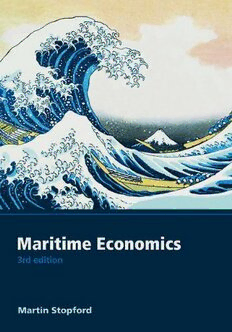Download Maritime Economics, 3rd Edition PDF Free - Full Version
Download Maritime Economics, 3rd Edition by Martin Stopford in PDF format completely FREE. No registration required, no payment needed. Get instant access to this valuable resource on PDFdrive.to!
About Maritime Economics, 3rd Edition
For 5000 years shipping has served the world economy and today it provides a sophisticated transport service to every part of the globe. Yet despite its economic complexity, shipping retains much of the competitive cut and thrust of the “perfect” market of classical economics. This blend of sophisticated logistics and larger than life entrepreneurs makes it a unique case study of classical economics in a modern setting. The enlarged and substantially rewritten Maritime Economics uses historical and theoretical analysis as the framework for a practical explanation of how shipping works today. Whilst retaining the structure of the second edition, its scope is widened to include: lessons from 5000 years of commercial shipping history shipping cycles back to 1741, with a year by year commentary updated chapters on markets; shipping costs; accounts; ship finance and a new chapter on the return on capital new chapters on the geography of sea trade; trade theory and specialised cargoes updated chapters on the merchant fleet shipbuilding, recycling and the regulatory regime a much revised chapter on the challenges and pitfalls of forecasting. With over 800 pages, 200 illustrations, maps, technical drawings and tables Maritime Economics is the shipping industry’s most comprehensive text and reference source, whilst remaining as one reviewer put it “a very readable book”. Martin Stopford has enjoyed a distinguished career in the shipping industry as Director of Business Development with British Shipbuilders, Global Shipping Economist with the Chase Manhattan Bank N.A., Chief Executive of Lloyds Maritime Information Services; Managing Director of Clarkson Research Services and an executive Director of Clarksons PLC. He lectures regularly at Cambridge Academy of Transport and is a Visiting Professor at Cass Business School, Dalian Maritime University and Copenhagen Business School.
Detailed Information
| Author: | Martin Stopford |
|---|---|
| Publication Year: | 2009 |
| ISBN: | 203891740 |
| Pages: | 840 |
| Language: | English |
| File Size: | 35.964 |
| Format: | |
| Price: | FREE |
Safe & Secure Download - No registration required
Why Choose PDFdrive for Your Free Maritime Economics, 3rd Edition Download?
- 100% Free: No hidden fees or subscriptions required for one book every day.
- No Registration: Immediate access is available without creating accounts for one book every day.
- Safe and Secure: Clean downloads without malware or viruses
- Multiple Formats: PDF, MOBI, Mpub,... optimized for all devices
- Educational Resource: Supporting knowledge sharing and learning
Frequently Asked Questions
Is it really free to download Maritime Economics, 3rd Edition PDF?
Yes, on https://PDFdrive.to you can download Maritime Economics, 3rd Edition by Martin Stopford completely free. We don't require any payment, subscription, or registration to access this PDF file. For 3 books every day.
How can I read Maritime Economics, 3rd Edition on my mobile device?
After downloading Maritime Economics, 3rd Edition PDF, you can open it with any PDF reader app on your phone or tablet. We recommend using Adobe Acrobat Reader, Apple Books, or Google Play Books for the best reading experience.
Is this the full version of Maritime Economics, 3rd Edition?
Yes, this is the complete PDF version of Maritime Economics, 3rd Edition by Martin Stopford. You will be able to read the entire content as in the printed version without missing any pages.
Is it legal to download Maritime Economics, 3rd Edition PDF for free?
https://PDFdrive.to provides links to free educational resources available online. We do not store any files on our servers. Please be aware of copyright laws in your country before downloading.
The materials shared are intended for research, educational, and personal use in accordance with fair use principles.

